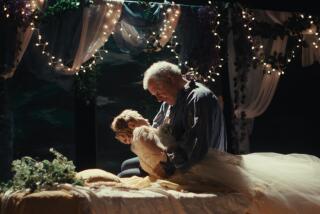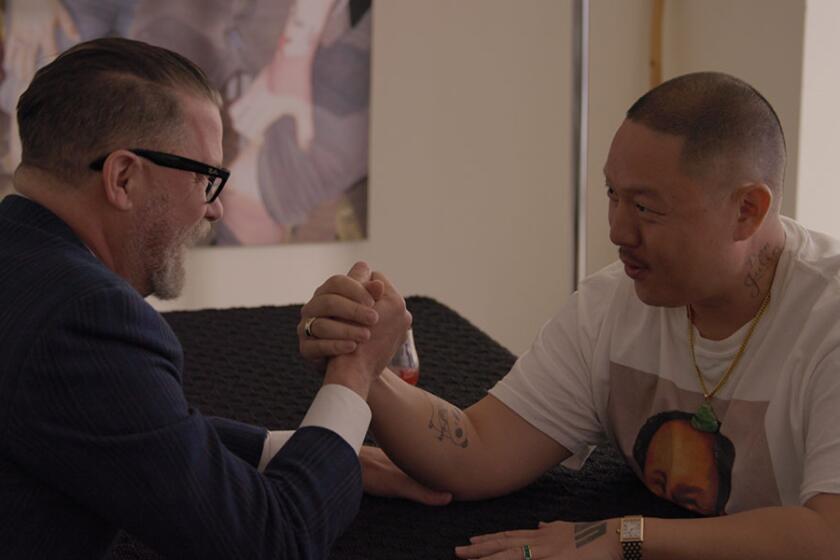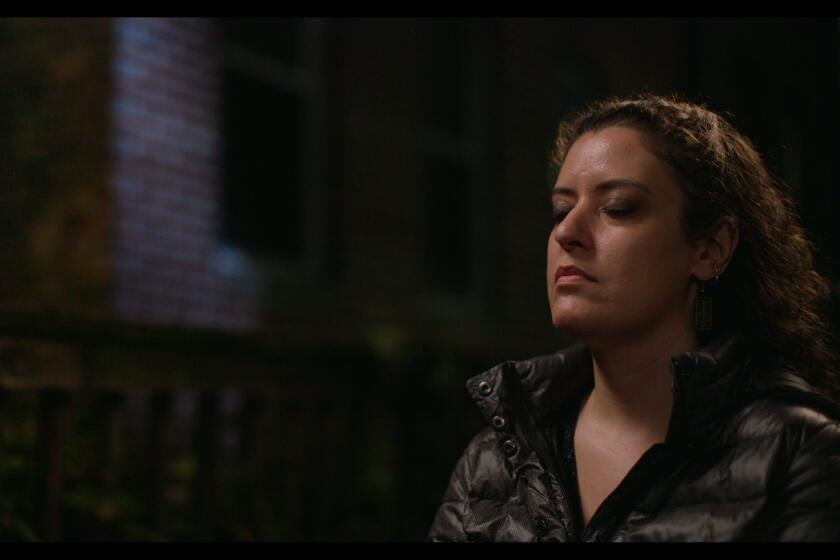With ‘Whiskey Tango Foxtrot,’ Tina Fey tries to reclaim a neglected genre
In 1970, the movie “MASH” entered, and advanced, a wartime-comedy genre that had long been a hallmark of American cinema. Directed by Robert Altman, the wry film was nominated for five Oscars and became a cultural event.
More than 45 years and numerous conflicts later, similar efforts are rarely undertaken. Modern war movies tend to be heroic calls to patriotism (think Pete Berg and Michael Bay) or grim affairs mired in hopelessness (think any documentary about Iraq or Afghanistan). Laughs and absurdism? In New Yorker cartoons, maybe.
Tina Fey and her longtime “30 Rock” writing collaborator Robert Carlock had a different idea.
The pair is behind the new movie “Whiskey Tango Foxtrot,” a film that attempts to tell of the horrors of war from a lighter and more human standpoint. Fey and Carlock were motivated by the idea of returning to the days of the humorous battlefield tale, a desire to cast a different light on military engagement.
See more of Entertainment’s top stories on Facebook >>
Or maybe they’re simply kamikazes.
“I think it speaks to how little Robert and I understand show business,” Fey said when asked what prompted her bid at genre revival. “Next we’re doing a Technicolor musical with racial overtones.”
Quips aside, the actress-producer has reason to feel empowered. In a cinematic setting fraught enough for Hollywood to resist even a conventional action movie, Fey has managed to create the unthinkable -- a dramatic comedy.
To top it off, her movie is based on a print journalist’s memoir, Kim Barker’s “The Taliban Shuffle.” And to top it off even further, the film comes from a big studio. Paramount opens “Whiskey Tango Foxtrot” on Friday, backed by an extensive marketing campaign.
Yet even as it seeks a return to a war-comedy heyday, “Foxtrot” is a reminder of how unfamiliar the genre is to modern audiences. And it reminds -- the filmmakers, first and foremost -- of how difficult making such a film can be.
Directed by Glenn Ficarra and John Requa (the mixed-tone masters of movies like “Crazy, Stupid, Love.”) “Whiskey Tango Foxtrot” chronicles the adventures of Barker as a correspondent in 2000s-era Afghanistan. Here she is renamed Kim Baker, her affiliation changed from the Chicago Tribune to a CNN-like entity, but the journalist’s essential tale remains the same.
Fresh from the U.S., the protagonist (Fey) quickly finds herself in seriocomic hot water. She is in a political dance with a moralizing Afghan official (Alfred Molina) and a close relationship with her local fixer (Christopher Abbott). Both are based on Barker’s real life.
She also is in a frenemy situation with Margot Robbie’s fellow reporter (a character created for the movie) and a love affair with Martin Freeman’s daredevil photographer (based on a real person, but the romance is invented).
The film is not nearly as pure a comedy as marketing materials suggest. But it’s peppered with more humor than almost any military picture in recent memory.
“It’s hard to manage the mixed-tone movie,” Requa said. “But I don’t think war movies should ever be unrelentingly dark. War is already so dark by nature. It’s almost like you need humor to restore the humanity.”’
“We’re not trying to make light of war,” Ficarra said. “We’re just trying to make a movie as reflective of reality as possible.”
Fey came upon the material in an unusual way. The review of “Taliban Shuffle” in the New York Times noted that Barker had a Tina Fey-like way, prompting the actress and her representatives to seek out the book. (Hollywood-minded authors, take note.) Soon Fey had acquired the rights and, along with fellow “30 Rock” executive producer Lorne Michaels, was producing the project. Carlock also came aboard.
In his early drafts, the writer went for a broader style of comedy. But he and Fey came to feel that undermined the serious moments, especially the film’s poignant end, which Barker was steadfast about. (The ads maintain a more slapsticky spirit.)
Also not simple was the title. “The Taliban Shuffle” was never going to fly, in part because half the shuffle Barker references, between Afghanistan and Pakistan, didn’t exist here. (Pakistan had not been included in the film.) And a studio executive was more likely to spend a year in space than put “Taliban” in the title of a wide commercial release.
Marketers flirted with some other names. “Fun House.” “The Bang-Bang.” You see the challenge.
Eventually the studio and filmmakers settled on “Whiskey Tango Foxtrot,” which retained a dance overtone and also was military-speak for an expression of disbelief. (Turn it into an acronym for the full effect.)
Like Barker’s book, the film is episodic, and whether individual scenes work and/or cohere with each other will be for viewers to decide.
But there are undeniably set pieces that moviegoers rarely see. In one, Baker dons a burqa to infiltrate a Taliban protest, with surprising results; in another, Freeman’s Iain character is kidnapped, and it’s played not sensationally but straightforwardly, as it does in a part of the world where such events are common.
Meanwhile, a soldier named Coughlin is compromised by a piece of Kim’s reporting -- the movie’s most dramatic subplot, based on a true Barker story. But such tales co-exist alongside jokes about war-zone attractiveness and casual sex and substance use among the journalist set. We’re far away from “Spotlight” country.
The underlying message in nearly all these scenes is that war can attract some courageous characters and require some bravery, but it also can attract some oddball characters and require a capacity for the Dadaist.
“Kim’s book was the first time I’d seen the comedy come through with people living in these situations, where no matter the circumstances, they find a way to laugh,” Carlock said. “What I was trying to do was communicate that feeling that, at a certain point, even the darkest war becomes your normal. And when it becomes your normal it can be funny.
The writer has a point. After all, plenty of authors once explored this very idea (Kurt Vonnegut and Joseph Heller, to name two). So did plenty of movies, before and after “MASH” (“Dr. Strangelove” and “Good Morning Vietnam,” to name two more).
“There’s a sense in today’s Hollywood and among a lot of modern fiction writers of treating war with a certain reverence, as if people aren’t living their lives, or having the sense of humor and hopes and dreams they have over here,” said Barker, now a narrative investigative reporter stateside for the New York Times. “But just because there’s a war going on doesn’t mean people aren’t laughing. In fact, in some of these absurd situations laughing is the only thing you could do to make sense of it.”
So why has modern Hollywood forsaken these tales?
Those involved in the movie have some intriguing theories (beyond the general rule that it’s harder for any non-superhero movie to get made these days).
“If you look back at an earlier generation, everyone served in a war, and it would be OK to laugh at this experience,” Fey said.
Added Carlock: “I think the draft is indeed a big part of it. If you’re outside, you’re not supposed to laugh at the men and women on the inside.”
War in the 21st century also comes with an abundance of real-time footage, much of it gruesome, which makes comedy difficult. Could Walt climb into a coffin at a satire of the Last Supper if explosions across Korea were streaming over cable news and social media every five minutes?
And finally, it may be that to make comedies or any other kind of messiness out of war would be to challenge a kind of collective rationalization.
“I think people have become very reverential toward war because to a certain extent it makes us feel better about committing to it in the first place,” Ficarra said.”There’s a simplicity to war [in the media] today that makes a war comedy harder to digest.”
It took someone like Fey to break these taboos. The actress has a lot of goodwill in Hollywood. More important, she has a certain kind of will. As viewers watched for years on her iconoclastic “30 Rock,” she could be exasperated with an entertainment status quo and channel it in a productive direction.
“As a person who is often cast as the sane person in the insane world, this just seemed like a fantastical real-life version of that,” Fey said. “And that’s what felt interesting to me. I’m always looking for something different in making movies -- like correspondents in a war zone. As opposed to, you know, some ladies who work at a magazine.”
Twitter: @ZeitchikLAT
MORE:
Another foray goes astray in Afghanistan in ‘Whiskey Tango Foxtrot’
With ‘Waitress,’ an indie film becomes a musical, intimately
‘Spotlight’s’ Tom McCarthy took an unusual path to Oscar victory
More to Read
Only good movies
Get the Indie Focus newsletter, Mark Olsen's weekly guide to the world of cinema.
You may occasionally receive promotional content from the Los Angeles Times.











